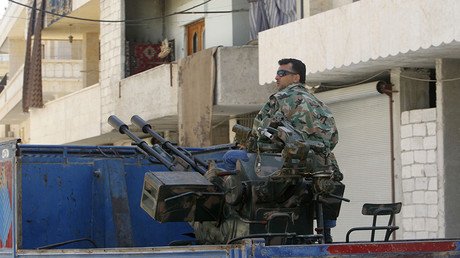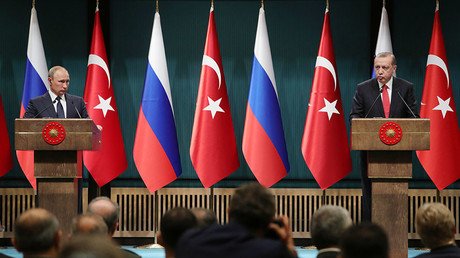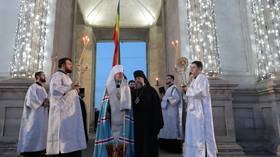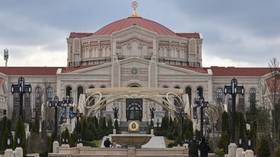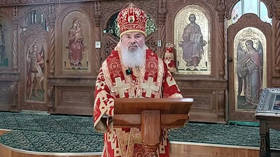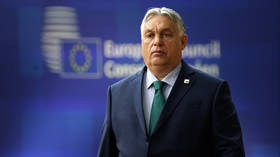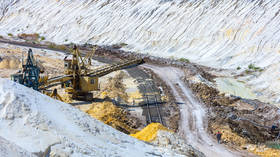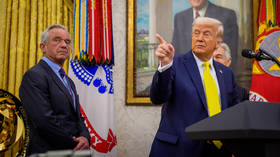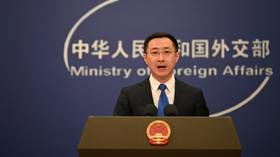Erdogan: Turkey’s working with Syrian rebels to secure Idlib peace zone
Turkey has been implementing the Russian-backed deal to curb violence in Syria’s Idlib province, together with Free Syrian Army anti-Assad rebels, Turkish President Recep Tayyip Erdogan said, noting that the operation has so far been going smoothly.
"Now we are applying the Astana decisions in Idlib," Erdogan said Sunday, speaking at a meeting of his ruling Justice and Development (AK) Party in Turkey’s western Afyon province.
The Turkish president noted that the Turkish forces in the northwestern Syrian province bordering Turkey are taking part in the operation alongside the Free Syria Army rebel group it has long supported.
It was also reported that Turkish reconnaissance units were active in Idlib on Sunday.
"Our efforts in Idlib are going on, in cooperation with the Free Syria Army, without problems at the moment," Erdogan said.
Earlier Sunday, Erdogan’s prime minister, Binali Yildirim, said that Turkey has been coordinating its efforts in the Idlib province with Russia.
“We will ensure safety in Idlib, and will cooperate with Russia,” Reuters reported Yildirim as saying.
The proposal to establish four de-escalation zones in Syria, championed by Russia, was finalized in September at the latest round of Syria peace talks in Kazakhstan's capital, Astana, with Idlib becoming the fourth zone created under the deal. The deal signed by Russia, Iran and Turkey and approved by the Syrian government is aimed at separating extremist groups such as Islamic State (IS, formerly ISIS, ISIL) and the former Al-Nusra Front from the moderate opposition. To ensure there are no clashes between the government forces and rebels, Russian, Iranian and Turkish forces are monitoring the situation in the designated zones. The measure, which is set to last for six months, can be extended automatically with the consent of all three guarantors of the deal.
READ MORE: ‘Turning point’: Syrian peace process delegations on de-escalation zones
Russia has repeatedly stressed that the creation of safe zones is a temporary measure that should not compromise the territorial integrity of Syria.
“This is not a permanent measure and nobody among those who supported the creation of these zones has the intention to keep them forever and, in effect, create some kind of enclaves in Syrian territory for years to come,” Russian Foreign Minister Sergey Lavrov said in September.
Russian President Vladimir called the deal and its implementation an “issue of crucial significance” during his meeting with Erdogan late September, noting that it paved the way “for the end of the fratricidal war in Syria and the final defeat of the terrorists,” enabling Syrians to return back to normal life.
The fact that the Syrian government seems to tolerate the presence of the Turkish units on its territory for the first time, not outright denouncing the move as a flagrant violation of sovereignty, indicates a deeper level of cooperation that can potentially help ease the Syrian crisis toward an end, Ammar Waqqaf, director at the Gnosos think tank, told RT.
The Syrian government is “not fully endorsing this… but they are not calling it an aggression either,” Waqqaf said.
“This tells you that the cooperation between the countries has taken a step forward,” giving some hope of a way out of the Syrian crisis.
While the Free Syrian Army may not be a reliable partner, it may be worth giving them a chance to follow the road of political reconciliation, Waqqaf argued.
“If you do not offer them hope, they will still want to resist and sabotage every single political agreement, and if you want to offer them hope, who is going to guarantee them – it’s going to be Turkey,” he said.
He added that groups like the Free Syrian Army could be part of a potential power-sharing deal, provided they lay down their weapons.
